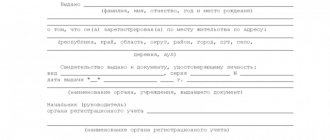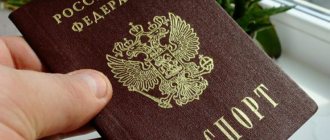It is generally accepted that the residential address indicated in the passport coincides with the actual place of residence. But life circumstances sometimes develop in such a way that the place of registration and the house do not coincide. In principle, a person has the right to live where he feels comfortable and convenient, regardless of registration.
However, such freedom of choice is not always a blessing and can often cause additional problems. Let's consider all cases in more detail.
Is it possible to live and not register?
The answer to the question of whether it is possible to do without registration should be sought in (hereinafter referred to as Law No. 5242-1). It obliges citizens to register at their place of temporary stay or permanent residence.
In accordance with paragraph. 1 tbsp. 6 of Law No. 5242-1, when changing permanent residence, a Russian citizen must collect and submit a package of documents for registration in another premises no later than a week after arrival.
In case of moving to a temporary place of residence, if the planned period of stay exceeds 90 days, the citizen is obliged to have time to register there temporarily during this period (paragraph 1 of article 5 of law No. 5242-1).
Thus, the state has established an obligation to comply with registration rules. Consequently, in case of their violation, grounds arise for legal liability for lack of registration at the place of residence.
Read more about how long you can live without registration.
The obligation of Russians to register
All citizens of the Russian Federation are required to have permanent registration. When moving from one region for long-term residence, it is important to notify FMS employees about the change of residence in a timely manner.
As a rule, only 7 days are allotted for this. Otherwise, the citizen may be held accountable. It should be noted that it will not be possible to live in any region of Russia without registration. After all, then a person will not be able to fully use government services, and many employers are afraid of the Federal Migration Service and do not want to hire workers without registration.
If a person leaves for a short time and plans to return back, then he should obtain a temporary registration at his place of stay.
There is also an important nuance in this case. A Russian has every right to reside in another region for 90 days.
That is, a fine for lack of temporary registration faces only those who live without temporary registration for more than 3 months. Sometimes it happens that a person comes to another city, but he does not have an apartment or real estate with friends where he could register. In this case, you can register in the place where he plans to stay:
- If a person comes for long-term treatment to a sanatorium, it is recommended to talk with the administration about providing temporary registration.
- In almost all major cities of Russia there are hotels where visitors can stay. If you stay in such an institution for more than 3 months, you need to talk to the management of the inn and ask for temporary registration.
- An alternative to a hotel is a hostel. To register in a room, you will need consent from the organization on whose balance sheet the building is located.
- If there is nowhere to register at all, that is, in the city there are no hotels, no boarding houses, no acquaintances with an apartment, no hostels, the only option left is to contact the social welfare authorities. Department employees will find a way out of the situation and provide temporary registration, for example, at a social service center.
Important!
A student studying in another city and living in a dormitory is also required to register there.
As a rule, registration in student “dorms” is provided by default. There is no need to negotiate this with the administration.
Responsibility for the residence of foreigners not at the place of registration
The right to choose a place of residence for foreigners and stateless persons is regulated by the rules on migration registration (hereinafter referred to as the Law on Migration Registration). So, in paragraphs. 2 and 3 tbsp. 6 of the Law on Migration Registration refers to the need to register these persons if they:
- temporarily and permanently reside in the Russian Federation;
- temporarily stay in the country, for example, for tourism purposes.
The procedure for registration is established in (hereinafter referred to as the procedure for migration registration).
From the above, it becomes clear that, while providing for the obligation to register for migration, the legislator did not forget about responsibility for failure to comply.
In general, domestic legislation welcomes the residence of guests of the country in the place where they are registered, and does not encourage their desire to live outside their place of registration.
Rules for registering a foreigner
There are strict registration rules for foreigners and stateless persons. In particular, they are given 7 working days to submit an application from the date of receipt of an official residence permit or residence permit.
If they are staying in the Russian Federation temporarily, the receiving party must notify them in writing within the same period of time of arrival at their location, for example, in the case of a trip on a work invitation. Otherwise, the responsibility lies with her.
Documents are submitted at the regional police department of the Ministry of Internal Affairs. The following are attached to the application:
- passport or other document identifying the foreigner;
- residence permit or official temporary residence permit;
- documents that confirm the legal basis for using housing, for example, a lease agreement;
- receipt of payment of state duty in the amount of 350 rubles.
Copies must be attached to the originals.
Once the registration authority receives the documents, the corresponding stamp is affixed to the residence permit or residence permit on the same day.
Find out more about how a foreign citizen registers at his/her place of stay.
Who is at risk of expulsion
Registration for migration is by no means a formal process. In theory, it implies not only the presence of a stamp on the document, but also the person’s residence in the specified premises.
In practice, the situation with foreigners is as follows. Suppose a foreign citizen is in a place of temporary stay or temporary residence, that is, the stay, for example, in a hotel room, is short-term. It is quite easy to identify the absence of a foreign guest, so negative consequences are inevitable.
If a foreign citizen is registered in a residential building as his permanent place of residence, then his short departure may not require re-registration. Therefore, each case is individual.
And yet, if it is determined that a foreigner has violated the rules of residence, he will bear legal responsibility. The person who prescribed it will not escape it either.
Thus, if you live in one place but are registered in another, as well as in case of other violations of migration registration by a foreigner, you will have to answer according to the following rules (hereinafter referred to as the Code of Administrative Offenses of the Russian Federation):
| Norm of the Code of Administrative Offenses of the Russian Federation | Violation | Sanction |
| Clause 1 Art. 18.8 | Violation of migration rules (including lack of registration and residence at a different address). | A fine of 2 to 5 thousand rubles with the possibility of expulsion from the country. |
| Clause 3 Art. 18.8 | Violation of the same rules in Moscow, Moscow Region, St. Petersburg or Leningrad Region. | A fine of 5-7 thousand rubles with or without expulsion from the borders of the Russian Federation. |
| Clause 4 art. 18.8 | Repeated violation of the rules. | Fine 5-7 thousand with expulsion. |
| Clause 5 Art. 18.8 | Repeated violation of the rules while in Moscow, the Moscow region, St. Petersburg or the Leningrad region. | A fine of 7-10 thousand with expulsion from the Russian Federation. |
It is important that expulsion for repeated violation of the rules in all constituent entities of the Russian Federation, except Moscow, the Moscow region, St. Petersburg and the Leningrad region, is possible only in the form of compulsory action.
In the four regions listed above, both forced expulsion and controlled travel abroad of the Russian Federation can be used at the expense of the foreigner or the person who received him.
Responsibility of the apartment owner for registration of a foreigner living at a different address
Responsibility for registration without residence, that is, for fictitious registration, lies not only with the foreigner, but also with the owner of the apartment. And this responsibility will no longer be administrative, but criminal.
According to Art. 322.2 (hereinafter referred to as the Criminal Code of the Russian Federation), for fictitious registration of a foreigner or stateless person at the place of residence in an apartment or house, the owner faces one of the following penalties:
- a fine in the amount of 100 to 500 thousand rubles or in the amount of total income for a 3-year period;
- execution of forced labor for up to 3 years;
- imprisonment for up to 3 years.
Responsibility is also provided for fictitious registration of foreigners at the place of stay (Article 322.3 of the Criminal Code of the Russian Federation). Moreover, the sanctions are the same as under Art. 322.2 of the Criminal Code of the Russian Federation.
It is important that registration and residence at different addresses in the same city is unacceptable for foreigners, therefore both the registered person and the one who registered him are responsible for it.
If the homeowner helps in solving the crime, he will avoid criminal punishment.
Read more about what fictitious registration is.
Who has the right to draw up an act
The initiator of drawing up a non-occupancy act is usually the owner of the apartment. But its direct registration can be carried out by different representatives, for example, employees of the management company or HOA. But in practice, a simplified version of drawing up a certificate is used, when the owner involves his neighbors as witnesses, at least three people who will confirm the absence of a person at this address. This method is simpler and more convenient, and in addition, such forms are accepted in court, provided that they are drawn up in compliance with all requirements and legal norms.
Today there are special companies that, when contacted by the owner, can take on this mission. These services are paid, but they greatly simplify the life of the owner himself, because the eviction process is extremely difficult.
Please note that regardless of how the act is drawn up, the presence of the property owner or lessor is required. Without it, it is impossible to initiate such actions.
Consequences for citizens allowed to live outside their place of registration
Russian according to Art. 19.15.1 of the Code of Administrative Offenses of the Russian Federation faces a fine for living not according to registration in the amount of 2 to 3 thousand rubles. In Moscow and St. Petersburg this amount increases to 3-5 thousand.
The liability of the owner of the premises - an individual - varies between 2-5 thousand. In Moscow and St. Petersburg it will increase to 5-7 thousand.
If the owner is a legal entity, the fine will be 250-750 thousand rubles, in cities of federal significance - 300-800 thousand.
There is a possibility that living outside the place of registration was the result of an error by the employee responsible for receiving and transmitting documents for registration at the Main Migration Department of the Ministry of Internal Affairs, for example, an employee of the passport office. Thus, an official may miss deadlines or submit documents containing false information.
If the action does not contain a criminal offense, the official will pay an administrative fine in the amount of 3 thousand to 5 thousand rubles (Article 19.15.2 of the Administrative Code).
In addition, Art. 322.2 of the Criminal Code of the Russian Federation provides for the following liability of officials for fictitious registration of a citizen of the Russian Federation:
- a fine in the amount of 100-500 thousand rubles or in the amount of the offender’s income for a 3-year period;
- punishment in the form of forced labor for up to 3 years with the possibility of deprivation of the right to perform professional duties;
- imprisonment for up to 3 years, with the possibility of deprivation of the right to perform their professional duties for up to 3 years.
Types of registration
A citizen can register at a new address temporarily or permanently. The type of registration depends on the goals pursued by the individual. For example: to move while studying, temporary registration is sufficient.
The rights for permanent and temporary registration are the same. The only difference is its validity period. Temporary registration is limited, its maximum validity is three years. When registering permanently, a stamp is affixed to the passport. Temporary registration requires a certificate.
From a legal point of view, there is no difference between types of registration. In practice, there are quite often situations where people with temporary registration have difficulty accessing high-paying jobs or bank loans.
How to pay a fine
The commission of an offense, as well as the punishment for it, is recorded in the protocol, and in case of fictitious registration - in the court verdict.
After the documents enter into legal force, the offender must pay a fine. To do this, you must have payment details or a scanning ID and select one of the following methods for transferring money:
- payment at a bank at a cashier, through a terminal or online banking services;
- transfer at a Russian Post office;
- payment through a terminal at the police department of the Ministry of Internal Affairs;
- online using payment ID.
By the way, at State Services it is possible not only to make payments using a bank card, but also to repay debt with money from an electronic wallet and from a phone.
After payment, we recommend keeping the receipt to avoid possible disputes about repayment of the fine.
Find out more about how to pay a fine for failure to register at your place of residence.
Advantages
Most often, the document is requested when initiating the process of forced eviction of a person from a living space. An eviction application can be filed by the owner of the property if someone is living in his apartment illegally, having a residence permit in a completely different place.
You can also contact us to draw up this document if you need to recalculate the utilities calculated for the absent tenant of the apartment. You can write a document in any form, inviting an authorized person and neighbors as witnesses.
Temporary registration in another city - plan
To obtain temporary registration, an individual must appear at the Social Insurance Fund in person. This registration is possible only with the consent of everyone registered in the living space.
To register you will need:
- passport;
- a document base;
- statement ().
In addition to the citizen applying for registration, each person registered in the living space must write an application. If the registered child is a minor, then the application is written for him by his legal representatives.
- Everything about registration: what is permanent and temporary registration, is it possible to register “to nowhere”
If the owner cannot appear in person at the Social Insurance Fund, then registration is carried out with his consent, certified by a notary.
As for minors, they are registered at the new address of their parents; the consent of other registered persons for this procedure is not required.
The registration certificate is issued in person within three days to several weeks. It is worth noting that an individual is required to register temporarily for three months. Otherwise, he will have to pay an administrative fine, the minimum amount of which is 1 thousand rubles.








